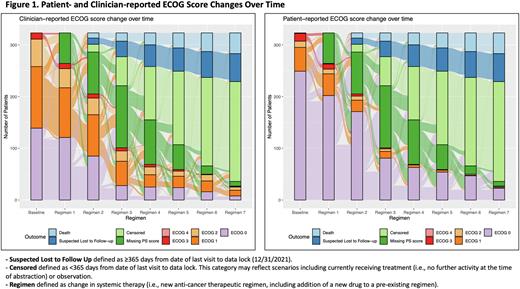Abstract
Introduction: In oncology clinical trials, performance status (PS) is commonly assessed by clinicians at trial outset using the Eastern Cooperative Oncology Group (ECOG) scale. Clinical trials in various tumor types have demonstrated that poor PS (i.e., ECOG PS 2-4) is correlated with lower overall survival (OS). Little is known about the longitudinal clinical course of patients with poor PS in traditional clinical trials, as this information is typically assessed only by clinicians at baseline, and many patients with detriments in PS are excluded. There is an opportunity for better quality PS information, using techniques such as serial post-baseline assessments and use of patient- and clinician reported PS. MM was selected as a disease to explore ECOG scores over time, as patients with MM typically have more than one relapse and require multiple lines of therapy, coinciding with changes in PS. We examined PS from a real-world cohort of patients with MM to demonstrate feasibility of assessing patient-reported PS and to explore the value of these longitudinal data.
Methods: FDA and COTA conducted a retrospective, observational cohort study using the COTA real-world database, a de-identified source of longitudinal electronic health record (EHR) data. The cohort included adult patients diagnosed with MM on or after January 1, 2013 treated at a single institution in the United States. Patients were required to have a baseline and >1 post-baseline ECOG measurement pair (i.e., near simultaneous patient- and clinician-reported ECOG data). Clinician-reported ECOG scores were captured at diagnosis and at each change in anti-MM treatment regimens (including addition of a new drug to a pre-existing regimen). Patient-reported ECOG was matched to clinician-reported assessments by date. Patients were asked to verbally indicate PS based on the ECOG prompts and this was recorded by clinic staff prior to the clinical encounter. Patients were excluded if they had a missing or imprecise date for key study events including date of diagnosis, date of last visit, or date of death. Descriptive analyses were conducted to summarize demographic and clinical characteristics and concordance/discordance between clinician- and patient-reported ECOG scores across visits. Alluvial plots were created to present transition of patient and clinician-reported scores over time and visualize reasons for missing score pairs.
Results: A total of 323 patients were identified to who met the study criteria. The study cohort had a median age of 65 years and were mostly male (54%) and white (78%). Patient- and clinician-reported ECOG scores over time are shown in Figure 1. A larger percentage of patients reported no detriment in PS at diagnosis as compared to clinicians (ECOG 0 = 77% vs. 43%, ECOG 1 = 14% vs. 37%, respectively). Concordance between patient- and clinician-reported scores was greatest at diagnosis and regimen one (50% and 51%, respectively). Concordance generally decreased over time, with regimen seven having the lowest concordance (33%). Across all visits, the most common discordant score pair was clinician-reported ECOG 1 and patient-reported ECOG 0.
Conclusions: Among the real-world MM cohort we analyzed, there was an increasing discordance of PS over time between patients and clinicians at key clinical timepoints. The directionality of discordance (less dysfunction reported by patients) is the reverse of other published reports. Previous analyses of symptomatic adverse events have shown patients report more frequent and severe symptoms when compared to clinician-report. There are several important limitations of this study. These data were only collected at a single institution, which could result in selection bias and limit generalizability. Patient-reported data are also subject to recall bias, as patients may remember or report symptoms differently than clinicians, particularly as patients were not given a recall period. Lastly, reasons for missing score pairs included loss to follow up, lack of documented PS score, death, or censorship. Most patients did not have score pairs available after regimen three, limiting our ability to draw longer term conclusions. Future research will explore subgroups within score matched cohorts and correlate PS scores to OS to determine the predictive ability of patient- and clinician-reported PS relative to long-term patient outcomes.
Disclosures
Fernandes:COTA, Inc: Current Employment. Chen:PerkinElmer: Other: Spouse employed by PerkinElmer. Barcellos:COTA, Inc: Current Employment. Belli:COTA, Inc: Current Employment, Current equity holder in private company. Hansen:COTA, Inc: Current Employment, Current equity holder in private company. Wang:COTA, Inc: Current Employment, Current equity holder in private company.
Author notes
Asterisk with author names denotes non-ASH members.


This feature is available to Subscribers Only
Sign In or Create an Account Close Modal